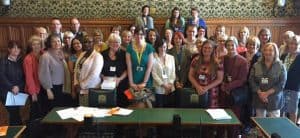On 17 May 2016, our Media Liaison Leader Nik Harris attended the third All Party Parliamentary Group on Breastfeeding and Inequalities in the Houses of Parliament. This is her account of the meeting:
The All Party Parliamentary Group on Breastfeeding and Inequalities was set up by MP Alison Thewliss to address questions about breastfeeding and breastfeeding support in the UK.
There was a fantastic turnout by all of the UK breastfeeding charities as well Healthcare Professionals, MPs and other breastfeeding advocates.
Mike Brady gave a great presentation on the work of Baby Milk Action with clear and concise action points that are available right now to the government, as well as changes in the law that the 
Maureen Minchin made a fantastic contribution to the meeting after Mike and Helen’s presentation. The discussion was energetic and included innovative ways to get the attention of MPs, as well as how to persuade breastmilk substitute companies to stick within the law. Maureen explained that, in Australia, MPs have used questions in their Houses of Parliament to name and shame companies. She also spelled out that we need to be aware of our language to slowly unpick the firmly rooted idea that breastmilk substitutes are unproblematic, that breastmilk is just that little bit better. For example, premature babies in NICUs are far less likely to get Necrotising Enterocolitis (NEC) when given human milk; instead of using this language, we could be talking about the far higher risks of babies getting NEC when given breastmilk substitutes. Maureen also argued the importance of using fortifiers that are not bovine based, as there has been a study that shows a strong correlation between premature babies receiving any bovine based substances and increased mortality.
This led the discussion onto how much money in real terms some Clinical Commissioning Groups (CCGs) are spending on breastmilk substitutes, including medically specialised formula. Recently, Cambridge CCG was shocked to find through an audit that it spent close to £1million in one year on breastmilk substitutes alone. I asked if this showed a clear case for supporting breastmilk donation through properly funded human milk banks and proposed this as an area where joined up thinking could result in a clear cohesive strategy. I argued that there is no supply shortage of donated human milk, but simply a lack of enthusiasm from the top-down. This means that many milk banks in the country are only operational because of the exceptional work of a few staff (especially midwives), despite the lack of funding and sufficient staff. There are examples of milk banks working really well and being a great resource for donated human milk, both in the UK and internationally (Brazil is a great example with their firefighters helping to collect and drop off donations of milk!)
One of the midwives present talked about a recent situation where she had to deal with two aggressive and confrontational ‘formula reps’ coming into the hospital where she worked: they entered private areas in the maternity unit without prior approval or appointment, and even spent time one-to-one with the matron on the ward. Mike Brady reminded us about the film ‘Tigers’ which is the story of a ‘formula rep’ in Pakistan showing the huge pressure these representatives are under, not only to sell the formula, but also to set up and maintain strong links with local health care professionals. Mike showed a recent Nestle (which now owns SMA) recruitment advert for reps specifically aimed at growing their relations with health care professionals to support the growth of the SMA brand. The great news that the Royal College of Paediatricians has recently voted to no longer receive any funding from breastmilk substitute companies was mentioned; it is hoped that conversations with the Health Visiting profession will continue and that similar choices will be made.
There was also discussion about strategies to provide the support mothers need – something which is at the heart of LLLI’s work – and plans for National Breastfeeding Celebration Week. Dr Amy Brown was present; she recently published research on ‘What Women Want’ and how to best provide support for breastfeeding mothers. We know that women who don’t receive support don’t continue to breastfeed and, therefore, how vital this is.
The next meeting of the APPG will be held on Tuesday, 5 July 2016.
Nik Harris, LLL Leader and Media Liaison
[email protected]
Mike Brady’s presentation http://archive.babymilkaction.org/scrolling/en/appgmay16.html
Dr Amy Brown What Do Women Really Want? Lessons for Breastfeeding Promotion and Education
LLLGB’s report on What Do Women Really Want?
Global health policies that support the use of banked donor human milk: a human rights issue http://www.ncbi.nlm.nih.gov/pmc/articles/PMC1766344/
LLLGB on Sharing breastmilk
Feeding Practices and NEC, Manimaran Ramani, MD, Assistant Professor and Namasivayam Ambalavanan, MD, Professor, 2013
Call for the Royal College to reject income from formula manufacturers https://laleche.org.uk/call-royal-college-reject-income/

